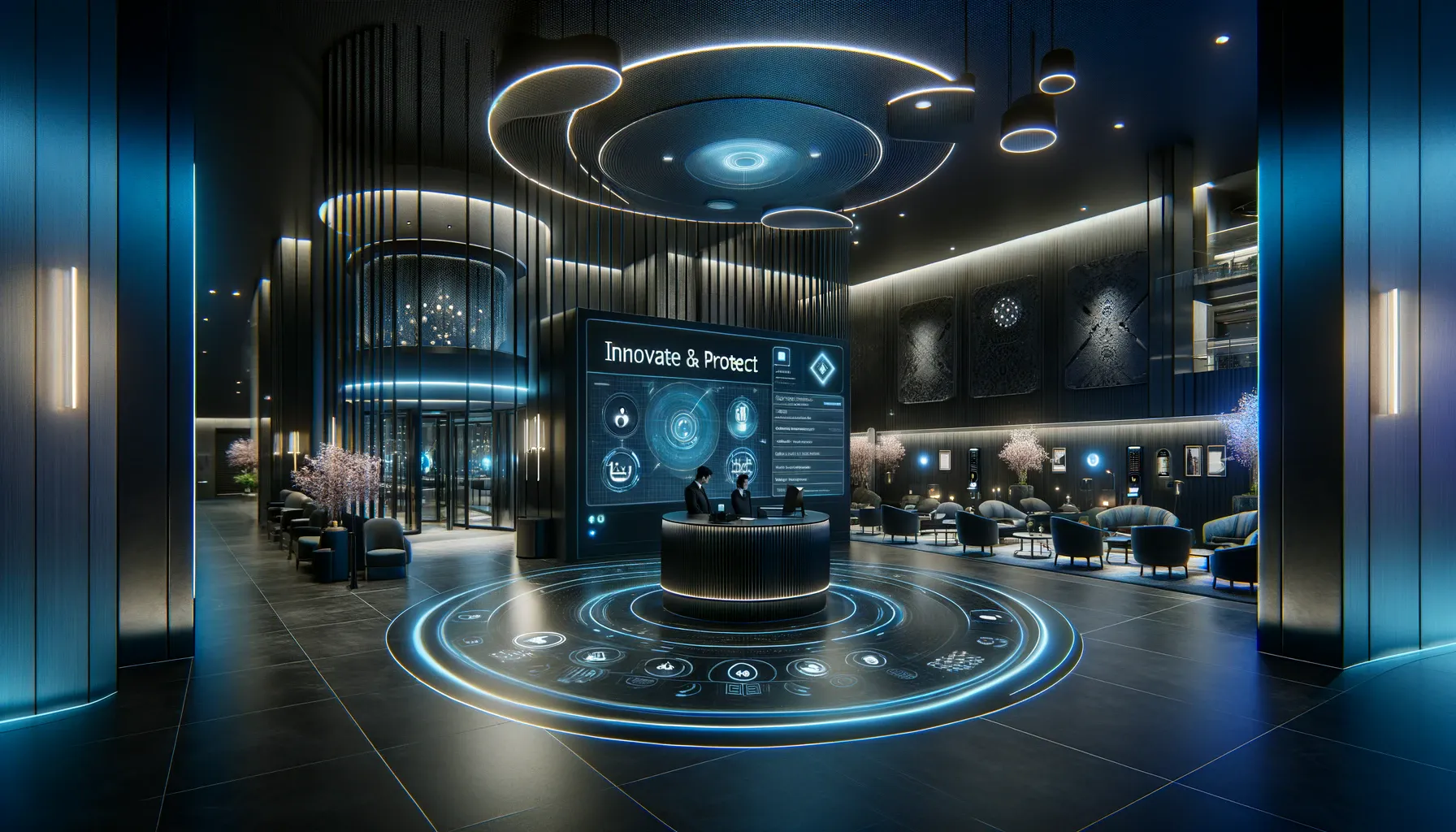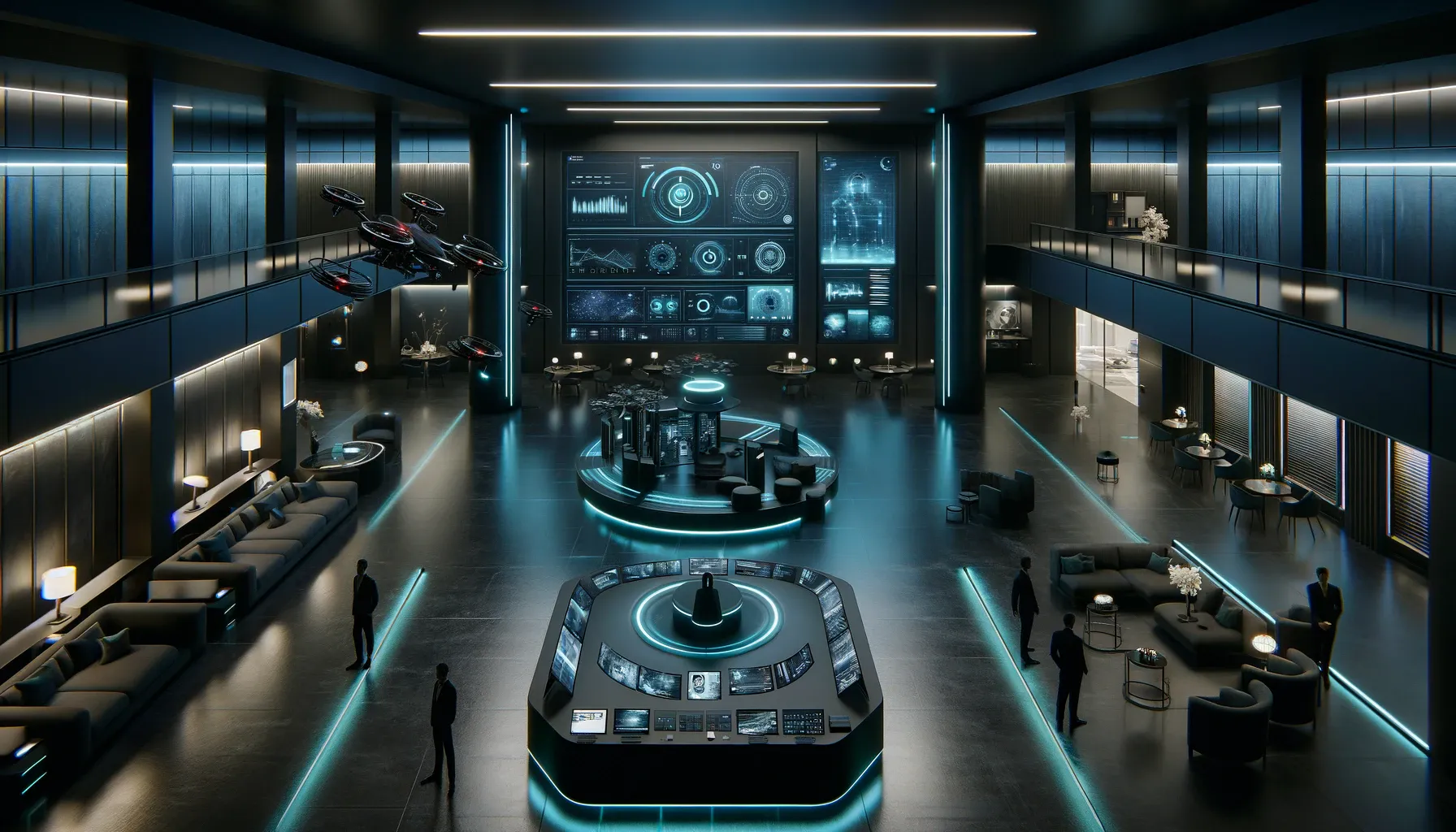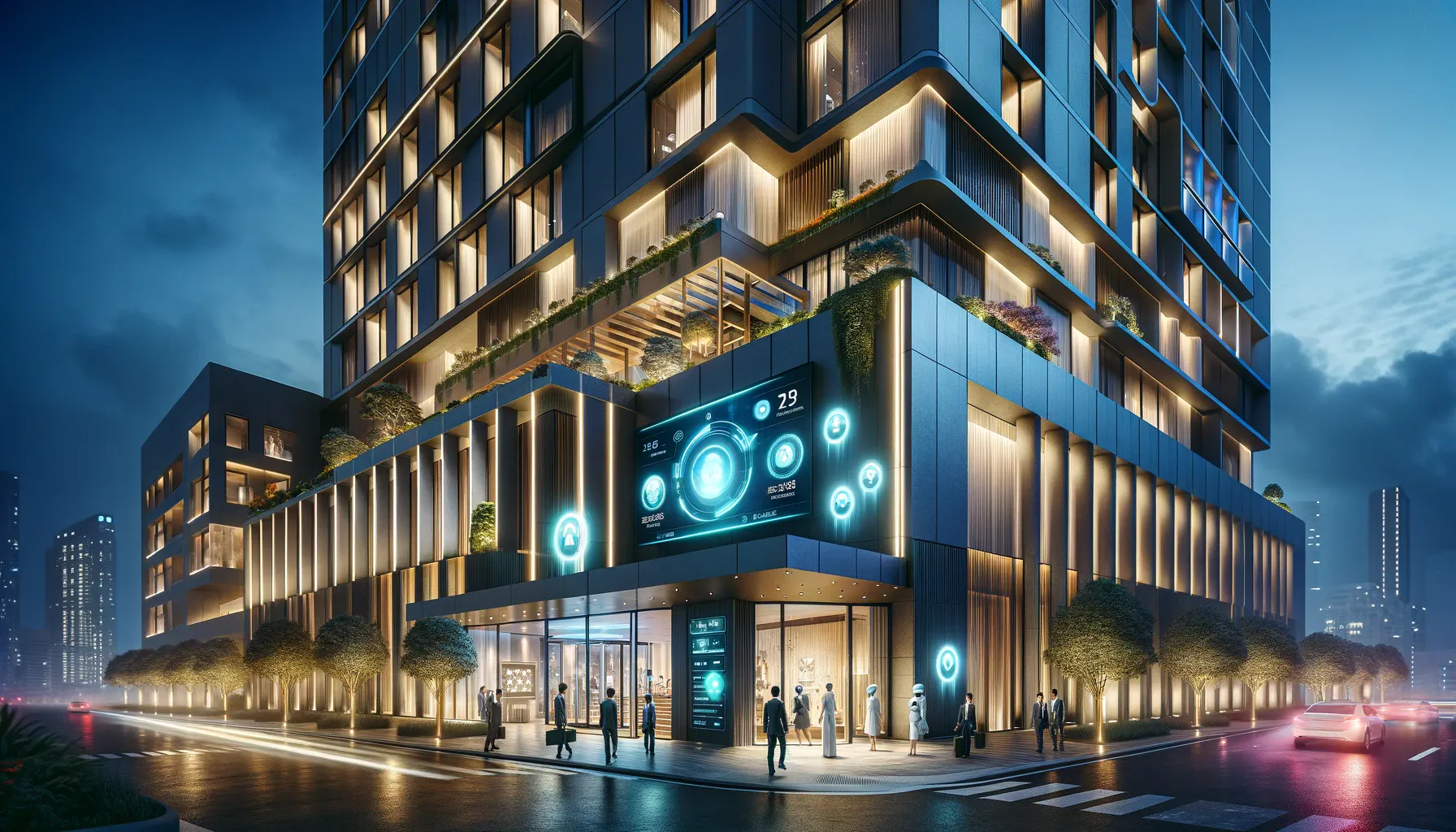Table of Contents
In an era of constantly evolving technology, hotels are turning to artificial intelligence (AI) to enhance their security measures beyond traditional locks and cameras. AI security innovations are revolutionizing how hotels protect their guests, staff, and assets while providing seamless experiences. This article will explore five innovative solutions showcasing AI’s pioneering role in hotel security, backed by real-world implementations.
1. Facial Recognition for Access Control for AI Hotel Security Innovations
Facial recognition technology has emerged as a game-changing solution in the domain of hotel security and access control. This innovative AI-driven approach replaces traditional key cards and offers a more secure and convenient way for guests to access their rooms.
How Facial Recognition for Access Control Works: Facial recognition for access control involves the use of AI algorithms to analyze a person’s facial features and match them to a pre-registered database of authorized individuals. When a guest arrives at a hotel, they can enroll their face in the system during check-in. Subsequently, to enter their room or access secure areas within the hotel, all they need to do is stand in front of a facial recognition camera. If their face matches the authorized profile, access is granted, eliminating the need for physical keys or cards.
Benefits of Facial Recognition in Hotels:
- Enhanced Security: Facial recognition adds an extra layer of security compared to traditional access methods. It is difficult to replicate or steal someone’s facial features, reducing the risk of unauthorized access.
- Convenience: Guests no longer need to carry key cards, worry about losing them, or wait in line at the front desk to check in. This streamlines the guest experience and saves time.
- Contactless Interaction: Particularly valuable in times of health concerns, facial recognition is a contactless solution that minimizes physical touchpoints, contributing to a safer and more hygienic environment.
Henn-na Hotel (Japan):
- Hotel Overview: Henn-na Hotel, located in Nagasaki, Japan, gained global attention for its unique approach to automation and technology in hospitality.
- Facial Recognition Implementation: The hotel integrated facial recognition technology extensively throughout its operations, from check-in to room access and even in-room controls.
- Benefits: Henn-na Hotel showcases how facial recognition technology can be an integral part of a hotel’s operations, providing guests with a futuristic and efficient experience.

2. AI-Powered Surveillance for AI Hotel Security Innovations
AI-powered surveillance systems represent a significant leap forward in hotel security. These systems combine advanced cameras with artificial intelligence algorithms to create a proactive and highly effective security solution.
How AI-Powered Surveillance Works:
- Advanced Cameras: AI-driven surveillance systems employ high-resolution cameras equipped with various features like night vision, motion sensors, and facial recognition capabilities. These cameras continuously monitor the hotel premises, including entrances, corridors, parking lots, and public areas.
- AI Algorithms: The heart of these systems lies in their AI algorithms. These algorithms are trained to analyze the video feed in real time, identifying patterns and anomalies. They can distinguish between normal guest behavior and potentially suspicious activities.
- Behavior Analysis: The AI algorithms continuously analyze guest behavior. They detect actions like loitering in restricted areas, attempting to access unauthorized zones, or leaving luggage unattended. These behaviors trigger alerts for further investigation.
- Immediate Alerts: When the AI detects unusual behavior or potential security threats, it triggers immediate alerts. These alerts are sent to hotel security personnel via a central monitoring system or directly to their mobile devices. This real-time response capability allows security teams to act swiftly.
- Integration: AI-powered surveillance systems often integrate with existing security infrastructure, including access control systems, alarms, and emergency response protocols. This ensures a coordinated and comprehensive security approach.
Arlo Technologies: Arlo Technologies provides AI-powered security cameras and surveillance solutions. These cameras are equipped with AI algorithms that can recognize and differentiate between people, animals, and vehicles. In a hotel setting, these cameras can be strategically placed to monitor entrances, parking areas, and other critical locations. If an unauthorized person enters a restricted area, the system can trigger alarms and notify security personnel.
3. AI Hotel Security Innovations: Smart Room Control and IoT Integration
In the ever-evolving world of hospitality, AI (Artificial Intelligence) is playing a pivotal role in shaping not just guest experiences but also hotel security. Beyond traditional security measures like locks and surveillance cameras, AI is driving innovations in smart room control and IoT (Internet of Things) integration. This article explores how AI hotel security innovations, particularly in the context of smart room control and IoT, are revolutionizing the way hotels ensure guest safety and satisfaction.
The Essence of Smart Room Control and IoT Integration
Smart room control refers to the implementation of AI-powered systems that allow guests to manage various aspects of their hotel room using a mobile app or voice commands. This includes controlling lighting, temperature, entertainment systems, and even room service requests. IoT integration involves connecting a network of smart devices within the room, such as thermostats, sensors, and voice-activated assistants, to create a seamless and responsive environment.
Hilton’s “Connected Room” Concept
Hilton, one of the world’s leading hotel chains, has been at the forefront of AI hotel security innovations with its “Connected Room” concept. This initiative leverages AI and IoT to offer guests a highly personalized and secure environment.
- Personalized Comfort: Through the Hilton Honors mobile app, guests can control room settings to suit their preferences. AI algorithms learn from previous stays, adjusting the room’s temperature and lighting to match individual comfort levels. For instance, if a guest prefers a cooler room at bedtime, the system will automatically set the temperature accordingly.
- Enhanced Security: The integration of IoT devices adds an extra layer of security. Smart locks can be remotely monitored and controlled through the app, reducing the risk of unauthorized access. If a guest leaves the room and forgets to lock the door, they can do so remotely, thereby enhancing their peace of mind.
- Efficiency and Sustainability: Smart room control also contributes to energy efficiency. When guests leave the room, the system can detect their absence and adjust settings to save energy. This not only benefits the environment but also reduces operational costs for the hotel.

4. Predictive Maintenance and Asset Protection for AI Hotel Security Innovations
AI-powered predictive maintenance is a game-changing innovation in AI Hotel Security Innovations. It combines the power of artificial intelligence with the need for asset protection, ensuring the reliability of security systems within hotels. This proactive approach not only enhances security but also significantly reduces operational costs, making it a crucial advancement in AI hotel security innovations.
How AI Predictive Maintenance Works in Hotels
AI-driven predictive maintenance is a groundbreaking component of AI Hotel Security Innovations. It involves continuous monitoring of security equipment, such as CCTV cameras, using sensors and data analytics. AI algorithms within AI Hotel Security Innovations analyze real-time data on factors like temperature, vibration, and usage patterns to predict maintenance needs. This proactive approach enhances guest safety and overall hotel security. Here’s how it works:
- Data Collection: Sensors and IoT devices are strategically placed on security equipment throughout the hotel, including CCTV cameras, access control systems, and alarms. These devices collect data on various parameters, such as temperature, humidity, and the number of hours each asset has been in operation.
- Data Analysis: AI algorithms process the collected data in real time. They use machine learning models to identify patterns and anomalies in the data. For instance, if a CCTV camera’s temperature starts to rise beyond a certain threshold, it may indicate a potential issue.
- Predictive Insights: Based on the analysis, the AI system generates predictive insights. It can estimate when a security asset is likely to require maintenance or replacement. These predictions are highly accurate, allowing hotels to take proactive action before any critical failures occur.
- Alerts and Notifications: When the AI system detects an impending maintenance need, it triggers alerts and notifications to the hotel’s maintenance team or security personnel. These alerts include details about the specific asset requiring attention and the recommended actions.

Hoxton Analytics is a company at the forefront of AI hotel security innovations, specializing in predictive maintenance and asset protection. They provide a comprehensive solution for hotels to ensure the reliability of their security systems. Here’s how Hoxton Analytics operates:
Hoxton Analytics places a network of sensors and IoT devices on various security assets within a hotel, including cameras, access control systems, and alarm systems. These sensors continuously collect data on the performance of these assets. The data is then sent to a centralized AI platform.
Using advanced machine learning algorithms, Hoxton Analytics analyzes the data in real-time. The AI system identifies patterns that may indicate issues such as overheating, component wear, or abnormal usage patterns. It can even forecast when an asset is likely to fail.
When potential issues are detected, Hoxton Analytics sends alerts to the hotel’s maintenance team, enabling them to schedule proactive maintenance. This preventive approach effectively eliminates the risk of unexpected breakdowns and costly downtime, ensuring that the hotel’s security systems are perpetually operational and aligned with the latest AI Hotel Security Innovations.
5. Virtual Concierge and Guest Safety for AI Hotel Security Innovations
Virtual concierge services are a prime instance of AI hotel security innovations that are transforming guest experiences and enhancing safety. These AI-driven devices, which fall under the category of AI Hotel Security Innovations, serve as virtual concierges in guest rooms, offering a range of services and functionalities while contributing to the overall security of the hotel.
Virtual Concierge Services and Guest Safety
- Enhancing Guest Experiences: AI-powered virtual concierge services are designed to provide guests with a personalized and convenient experience. These devices can interact with guests through natural language processing, answering their questions, providing information about hotel amenities, and even making recommendations for local attractions and restaurants. By offering such services, hotels not only improve guest satisfaction but also create a welcoming and comfortable environment.
- Improving Safety: Beyond enhancing guest experiences, virtual concierge devices also play a crucial role in hotel security. They are equipped with features that contribute to guest safety. For instance, they can provide information on emergency procedures, such as evacuation routes and protocols, which can be vital in case of unforeseen incidents like fires or natural disasters.
Angie Hospitality: One notable player in the field of AI-driven virtual concierge services, within the realm of AI hotel security innovations, is Angie Hospitality. Angie’s solution, known as “Angie,” is an in-room virtual concierge device that combines AI technology with voice commands and touch-screen interfaces to offer a wide range of services to hotel guests.
Features of Angie’s Virtual Concierge:
- Voice-Activated Assistance: Guests can interact with Angie using voice commands, making it easy to access information and request services without having to pick up the phone or visit the front desk.
- Safety and Security Information: Angie provides essential safety information to guests. In case of emergencies, guests can use Angie to quickly access details on evacuation procedures and contact hotel security or emergency services.
- Room Controls: Angie allows guests to control various aspects of their room, such as lighting, temperature, and entertainment systems, enhancing both comfort and security.
- Local Recommendations: The device can recommend local attractions and dining options, helping guests make informed decisions about their activities while ensuring they remain within safe and reputable areas.

Conclusion
The integration of Artificial Intelligence (AI) into hotel security systems is not just a technological trend; it’s a transformative force that is redefining how the hospitality industry ensures the safety and satisfaction of its guests through AI hotel security innovations. While traditional security measures such as locks and cameras remain crucial components of a hotel’s security infrastructure, AI hotel security innovations have opened up a world of possibilities and capabilities that go beyond these conventional tools.
As technology continues to advance, the potential for AI Hotel Security Innovations to further revolutionize hotel security is virtually limitless. AI can continuously adapt to new threats and challenges, making security more dynamic and responsive. Moreover, AI can also be leveraged to create highly personalized guest experiences, catering to individual preferences and needs, which is a critical factor in today’s competitive hospitality market. AI Hotel Security Innovations are not only about enhancing safety; they are also about elevating the overall guest experience to new heights.
AI hotel security innovations are a testament to the ongoing transformation of the hospitality industry. They are not only meeting the evolving security needs of guests but also enhancing their overall experience. Hotels that recognize and invest in AI-driven security solutions are not only future-proofing their operations but also ensuring that their guests can enjoy a safer and more enjoyable stay, setting new standards for excellence in the industry.